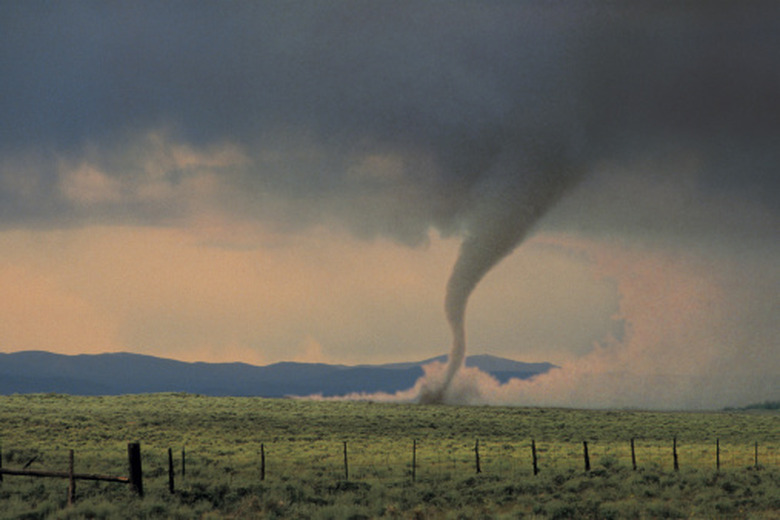What Are Characteristics Of Tornadoes?
Tornadoes are natural events that many people find both frightening and intriguing. The word "tornado" derives from the Spanish words "tornar," which means "to turn," and "tronada," which means thunderstorm. People can recognize tornadoes by their funnel shape, which consists of violently rotating winds. These winds can reach up to 200 to 300 mph in the strongest of tornadoes and cause severe damage to towns or cities.
Features
Features
A tornado is a swirling vortex or column of air with a hollow core. The circulating air often contains debris and dust and moves in an upward spiral at high speeds. The bottom of the tornado column makes contact with the ground, while the top of the tornado can extend 5 or more miles into the sky. Tornadoes can vary in shape, size and color. Tornado funnel shapes depend on a variety of factors including air pressure conditions, moisture, temperature, dust, the rate at which air flows into the vortex and whether air moves upward or downward in the tornado's core.
Formation Factors
Formation Factors
Scientists identify numerous weather factors that contribute to tornado formation. These factors include atmospheric stability, wind shear patterns, the amount and type of cloud covers and location of jet streams. A prominent factor in tornado development often is the clash of air masses. Tornadoes are more likely to form in regions where different air masses, such as dry and moist or hot and cool airs, clash. Most tornadoes also form during supercell thunderstorms. Supercell thunderstorms are large, long-lived thunderstorms that contain a mesocyclone, or a rotating vertical movement of air. Right before tornado formation, a more concentrated vortex, or rapidly rotating air current, may begin to form in the mesocyclone and a downdraft of cool air plunges to the ground. Beneath the mesocyclone, upward and downward moving air currents collide and create a warm and stationary boundary, or front. A tornado forms at the interface of these converging airflows.
Locations
Locations
Tornadoes occur all around the world, but they most frequently occur in the United States. According to "Tornadoes" by H. Michael Mogil, every U.S. state has faced at least one tornado. The majority of tornadoes in the U.S. arise in the Central Plains region nicknamed "Tornado Alley," which includes Kansas, Oklahoma, Nebraska and North Texas. "Tornado Alley" is a region where different air masses clash, and scientists understand that clashing air masses factor into the formation of tornadoes. Outside of the United States, tornadoes occur often in many countries, including France, Germany, Russia, the United Kingdom, Japan, Australia and Bangladesh.
Frequency
Frequency
In the book, "Tornadoes," author H. Michael Mogil says that on average 1,000 tornadoes are reported across America each year. These tornadoes cause an average of 80 deaths and 1,500 injuries. In the Northern Hemisphere, peak tornado seasons are in the spring months of April through June and in the fall months of September through November. According to "The Tornado: Nature's Ultimate Windstorm" by Thomas P. Grazulis, tornadoes can occur at any time of day, but they are most frequently recorded during the hours of 3 p.m. and 9 p.m. local time.
References
- "Tornadoes"; H. Michael Mogil; 2003
- "The Tornado: Nature's Ultimate Windstorm"; Thomas P. Grazulis; 2003
- "Extreme Weather: Understanding the Science of Hurricanes, Tornadoes, Floods, Heat Waves, Snowstorms, Global Warming and Other Atmospheric Disturbances"; H. Michael Mogil; 2007
Cite This Article
MLA
Drake, Julia. "What Are Characteristics Of Tornadoes?" sciencing.com, https://www.sciencing.com/characteristics-tornadoes-8464539/. 24 April 2017.
APA
Drake, Julia. (2017, April 24). What Are Characteristics Of Tornadoes?. sciencing.com. Retrieved from https://www.sciencing.com/characteristics-tornadoes-8464539/
Chicago
Drake, Julia. What Are Characteristics Of Tornadoes? last modified March 24, 2022. https://www.sciencing.com/characteristics-tornadoes-8464539/
